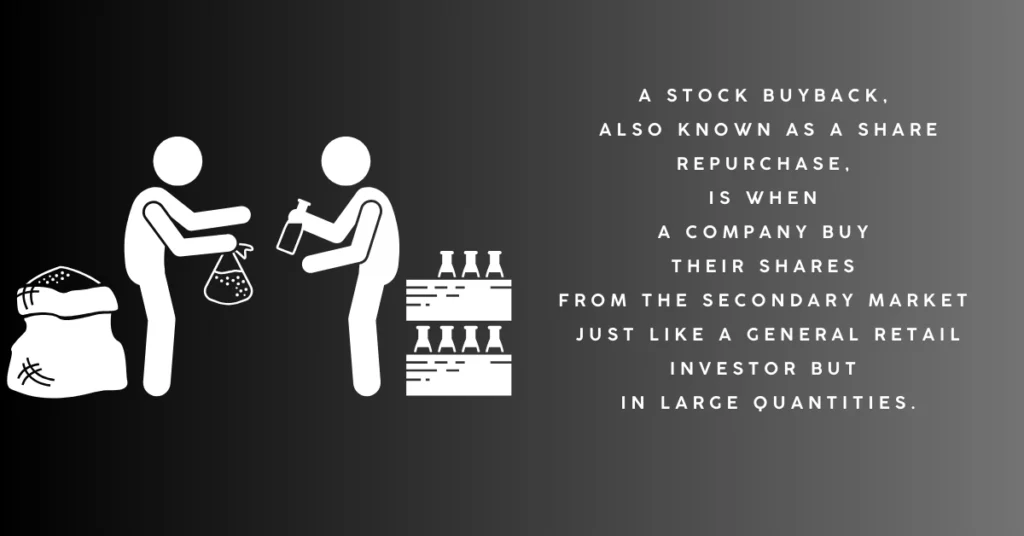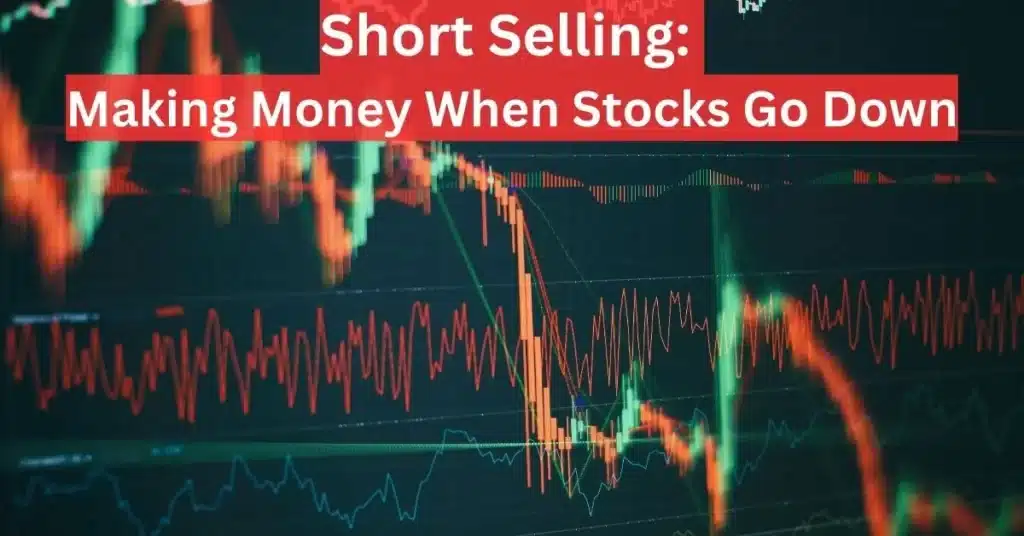Ever heard the term “stock buyback” and wondered what it means for your investments?
You’re not alone! In recent years, stock buybacks have become a hot topic in the financial world.
They’re a strategy many companies use to increase shareholder value, but opinions on them are divided.
Some see them as a smart move that signals a company’s strength, while others view them as a way to inflate stock prices without adding real value.
So, what’s the truth? Let’s dive in and explore the term ‘stock buybacks’ to see what it all means for you, the investor.
What is a Stock Buyback?
A stock buyback, also known as a share repurchase, is when a company buys its shares from the secondary market just like a general retail investor but in huge quantity.
This reduces the total number of shares available also known as outstanding shares, effectively increasing each remaining shareholder’s stake in the company.
Imagine a pizza cut into ten slices—if the company “buys back” two slices, the remaining eight slices each represent a larger portion of the pizza in percentage terms.
In simple terms, fewer shares mean each share is now worth a little more… at least in theory.
Companies conduct buybacks using cash reserves, borrowing money, or utilizing the profits they’ve earned.
They do this by purchasing shares in the open market or offering shareholders the chance to sell their shares back at a premium. But why go to the trouble of buying back shares?
Why Do Companies Buy Back Their Stock?
There could be many why a company wants its stock buybacks:
Boosting Stock Price
Buybacks often drive up a company’s stock price by reducing the number of shares in circulation.
With fewer shares available, basic supply-and-demand principles can push prices up, benefiting existing shareholders.
Improving Financial Metrics
A stock buyback can make a company look more financially attractive. For example, when a company buys back shares, its Earnings Per Share (EPS) can rise because there are now fewer shares over which to spread profits.
Investors often see higher EPS as a positive indicator of a company’s profitability.
Signaling Confidence
When a company buys back its stock, it’s often seen as a signal that the company’s leadership believes the stock is undervalued and is confident about the future.
It’s a bit like the CEO saying, “We’re so confident in our future that we’re investing in ourselves!”
Some companies use buybacks as a way to return value to shareholders, similar to paying dividends.
Instead of giving cash directly, they reduce the number of shares, potentially increasing the value of the remaining ones.
As an investor, a stock buyback can be both exciting and concerning. Here’s why:
The Good News
- Higher Stock Prices: When a company reduces its share count, your slice of the “corporate pie” gets bigger. This often leads to a rise in stock prices—good news if you’re holding shares.
- Tax Efficiency: In some regions, capital gains from rising stock prices are taxed less heavily than dividend income. Buybacks can be a more tax-efficient way of rewarding shareholders.
The Bad News
- Opportunity Cost: Money spent on buybacks isn’t being invested back into the business. That cash could have gone into research, new products, or expanding the company—activities that might provide more long-term growth.
- Management Motivations: Sometimes, companies use buybacks to meet short-term financial goals, like hitting quarterly EPS targets, rather than focusing on sustainable growth.
Have you ever wondered if a company might just be using buybacks as a “quick fix” to prop up stock prices temporarily?
It’s a fair question and one worth considering when you see a major buyback announcement.
Real-Life Example of a Stock Buyback
Consider Apple, one of the largest companies in the world. Over the past decade, Apple has spent hundreds of billions of dollars on stock buybacks.
In 2020 alone, they bought back nearly $70 billion worth of shares. The result? A rising stock price that has consistently rewarded its shareholders.
Apple’s strategy has been a textbook case of buybacks working as intended, boosting investor confidence and sending a signal that the company believes in its future.
Common Criticisms of Stock Buybacks
Stock buybacks aren’t without controversy:
- Short-Term Focus
Critics argue that buybacks encourage a short-term mindset. By spending money on repurchasing shares, companies may neglect long-term investments that could bring sustained growth. - Lack of Reinvestment
Using funds for buybacks instead of innovation can be seen as a missed opportunity. Shareholders might wonder—why isn’t the company reinvesting that money to expand or enhance its product line? - Market Manipulation
Some skeptics believe that buybacks can be a tool for manipulating stock prices. By reducing share count, executives with stock options might artificially inflate the value of their compensation packages.
Should You Be Concerned About Stock Buybacks?
As a beginner investor, here are a few things to keep in mind when you see a buyback:
- Look at the Context: Is the company performing well, or are they using buybacks to mask underlying issues? A healthy company using buybacks is different from a struggling one trying to inflate metrics.
- Management’s Track Record: Consider the motivations and history of the company’s leadership. Have past buybacks led to long-term gains or just short-term spikes?
- Balance is Key: Don’t panic over buybacks, but don’t automatically assume they’re a good thing either. Consider them one piece of the puzzle when evaluating a company.
Conclusion
Stock buybacks can be a powerful tool for companies—and a potential value investment or exit opportunity for investors. They aren’t inherently good or bad, but they do require some careful consideration.
Next time you hear about a major buyback, ask yourself what it means for the company’s future… and for your investment.
Also, Read | Stock Market terms



